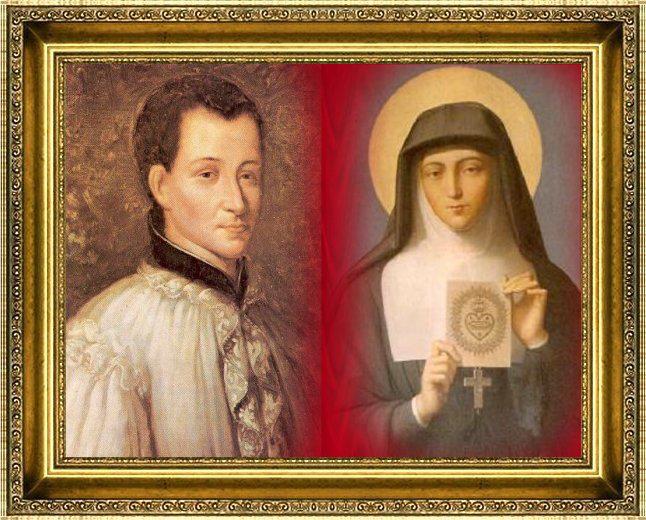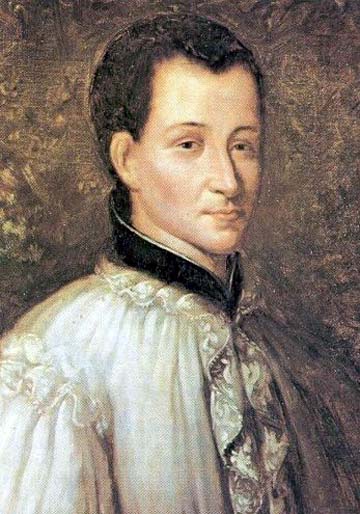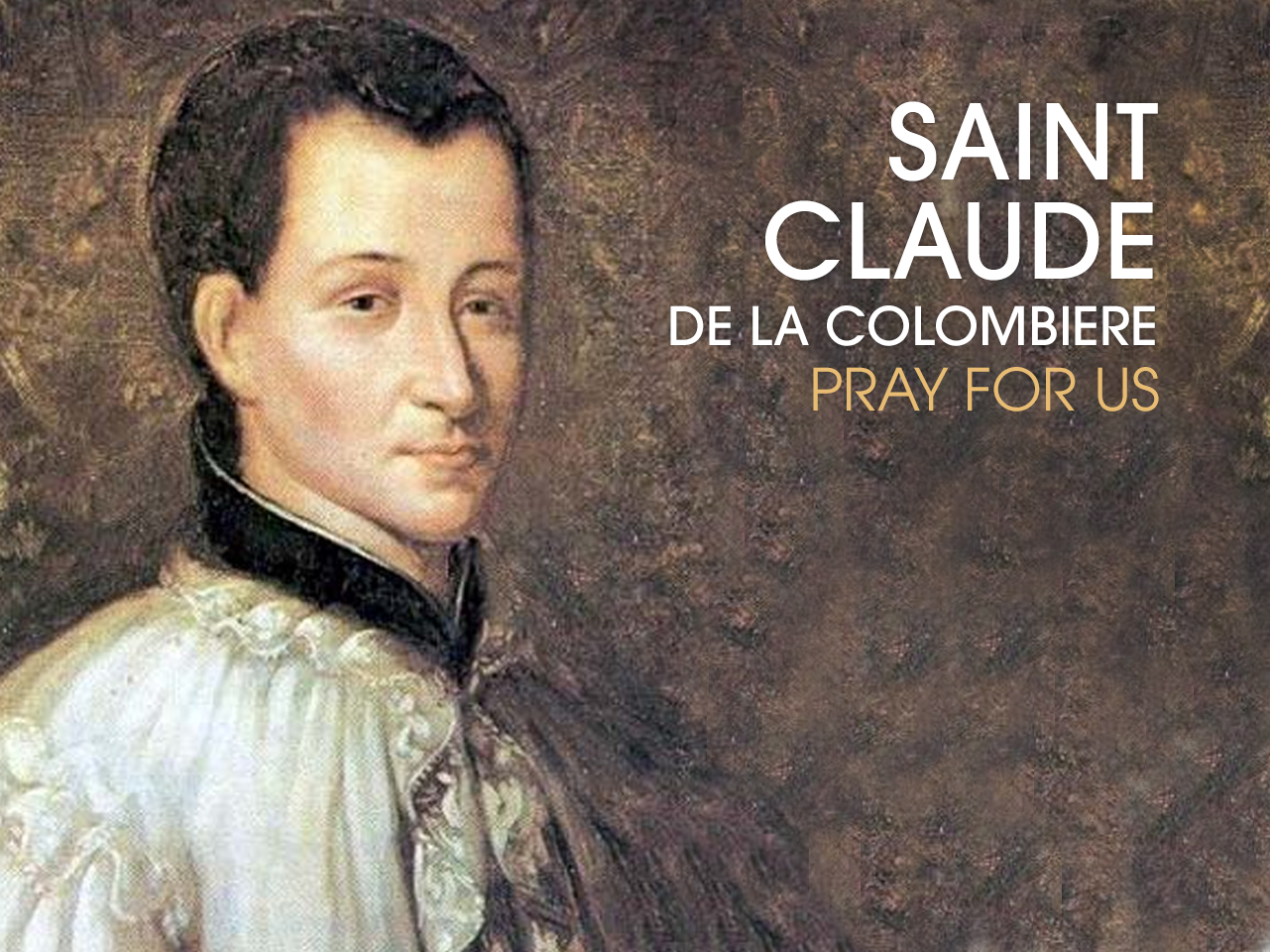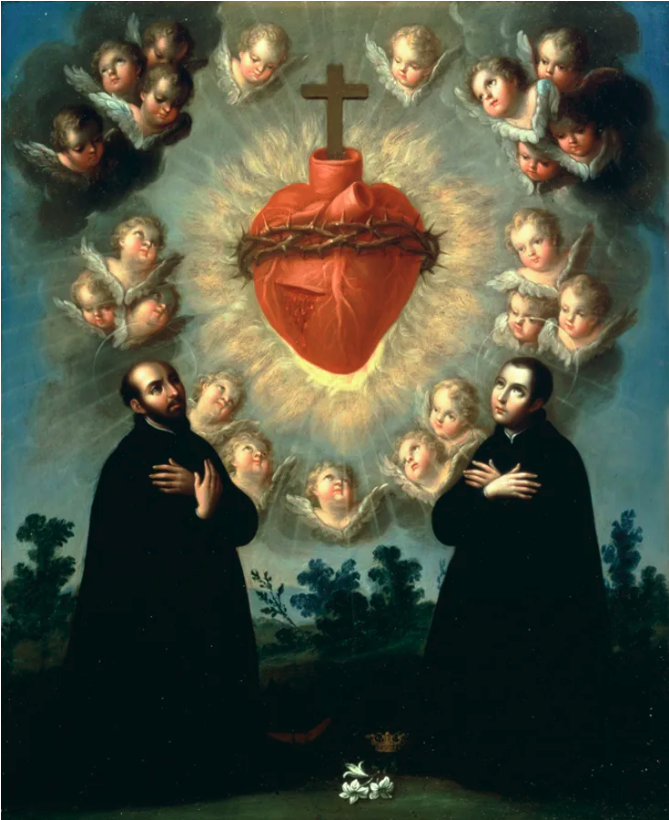
-The Sacred Heart of Jesus with St. Ignatius of Loyola and St. Louis Gonzaga
Many of you know of the McCormick family’s, and, therefore, especially my, special devotion to the Most Sacred Heart of Jesus. At dinner, after Grace, we say “O, Sacred Heart of Jesus, we place our trust in Thee!”
Claude de la Colombiere, SJ, descended of French nobility, third child of the notary Bertrand La Colombière and Margaret Coindat, was born on 2nd February 1641 at St. Symphorien d’Ozon in the Dauphine, southeastern France. After the family moved to Vienne, Claude began his early education there, completing his studies in rhetoric and philosophy in Lyon.
It was during this period that Claude first sensed his vocation to the religious life in the Society of Jesus. We know nothing of the motives which led to this decision. We do know, however, from one of his early notations, that he “had a terrible aversion for the life embraced”. This affirmation is not hard to understand by any who are familiar with the life of Claude, for he was very close to his family and friends and much inclined to the arts and literature and an active social life. On the other hand, he was not a person to be led primarily by his sentiments.
At 17 he entered the Jesuit Novitiate at Avignon. In 1660 he moved from the Novitiate to the College, also in Avignon, where he pronounced his first vows and completed his studies in philosophy. Afterwards he was professor of grammar and literature in the same school for another five years.
In 1666 he went to the College of Clermont in Paris for his studies in theology. Already noted for his tact, poise and dedication to the humanities, Claude was assigned by superiors in Paris the additional responsibility of tutoring the children of Louis XIV’s Minister of Finance, Jean Baptiste Colbert.
Claude became noted for solid and serious sermons. They were ably directed at specific audiences and, faithful to their inspiration from the gospel, communicated to his listeners serenity and confidence in God. His published sermons produced and still produce significant spiritual fruits. Given the place and the short duration of his ministry, his sermons are surprisingly fresh in comparison with those of better-known orators.
On 2nd February 1675 he pronounced his solemn profession and was named rector of the College at Paray-le-Monial. Not a few people wondered at this assignment of a talented young Jesuit to such an out-of the-way place as Paray. The explanation seems to be in the superiors’ knowledge that there was in Paray an unpretentious religious of the Monastery of the Visitation, Margaret Mary Alacoque, to whom the Lord was revealing the treasures of His Heart, but who was overcome by anguish and uncertainty. She was waiting for the Lord to fulfill His promise and send her “my faithful servant and perfect friend” to help her realize the mission for which He had destined her: that of revealing to the world the unfathomable riches of His love.
After Father Colombière’s arrival and her first conversations with him, Margaret Mary opened her spirit to him and told him of the many communications she believed she had received from the Lord. He assured her he accepted their authenticity and urged her to put in writing everything in their regard, and did all he could to orient and support her in carrying out the mission received. When, thanks to prayer and discernment, he became convinced that Christ wanted the spread of the devotion to his Heart, it is clear from Claude’s spiritual notes that he pledged himself to this cause without reserve.
After a year and half in Paray, in 1676 Father La Colombière left for London, remaining in contact with St Margaret Mary by letter. He had been appointed preacher to the Duchess of York – a very difficult and delicate assignment because of the conditions prevailing in England at the time. He took up residence in St. James Palace in October.
In addition to sermons in the palace chapel and unremitting spiritual direction both oral and written, Claude dedicated his time to giving thorough instruction to the many who sought reconciliation with the Church they had abandoned. And even if there were great dangers, he had the consolation of seeing many reconciled to it, so that after a year he said: “I could write a book about the mercy of God I’ve seen Him exercise since I arrived here!”
The intense pace of his work and the poor climate combined to undermine his health, and evidence of a serious pulmonary disease began to appear. Claude, however, made no changes in his work or life style.
Suddenly, at the end of 1678, he was calumniously accused and arrested in connection with the Titus Oates “papist plot”. After two days he was transferred to the severe King’s Bench Prison where he remained for three weeks in extremely poor conditions until his expulsion from England by royal decree. It was only by the intervention of Louis XIV that Claude was not martyred. This suffering further weakened Claude’s health which, with ups and downs, deteriorated rapidly on his return to France. On 15 February 1682, Claude began coughing up blood and died.
St John Wall, OFM, knew Saint Claude. After having spent a night in spiritual conversation with him, the soon–to–be martyr said, “When I was in his presence I thought that I was dealing with Saint John returned to earth to rekindle that fire of love in the Heart of Christ.”
Saint Claude de la Colombiere, SJ, is considered a “dry” martyr, having suffered every abuse for the Faith, except death. His major shrine and relics/remains are in the Jesuit church directly next to the Monastery of the Visitation in Paray-le-Monial, France.
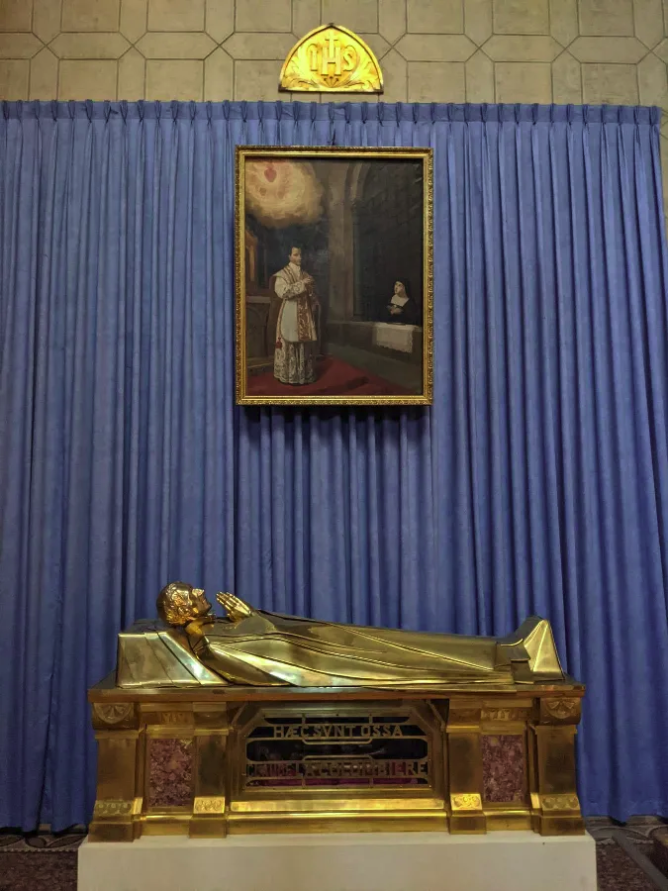
-tomb of St Claude de la Colombiere, SJ, Chapelle la Colombiere, Rue Pasteur, 71600 Paray le Monial, France, please click on the image for greater detail
“Avoid worrying, then, about anything else for your children except whatever may contribute to bringing them up virtuously. For the rest, having entrusted them to God, try to see what His will for them is, to help them along the path in life He has chosen for them. Never be afraid of relying too much on Him, but rather seek always to increase your trust more and more, for this is the most pleasing homage you can pay Him and it will be the measure of the graces you will receive. Little or much will be given you according as you have expected little or much.”
—St. Claude De La Columbiere, p.46, Trustful Surrender to Divine Providence
“…Make use of Our Lord as an armour which covers [us] all about, by means of which [we] shall resist every device of [our] enemies. You shall then be my Strength, O my God! You shall be my Guide, my Director, my Counsellor, my Patience, my Knowledge, my Peace, my Justice and my Prudence.”
—St. Claude la Colombiere
“The past three centuries allow us to evaluate the importance of the message which was entrusted to Claude. In a period of contrasts between the fervor of some and the indifference or impiety of many, here is a devotion centered on the humility of Christ, on His presence, on His love of mercy and on forgiveness. Devotion to the Heart of Christ would be a source of balance and spiritual strengthening for Christian communities so often faced with increasing unbelief over the coming centuries.” – Pope John Paul II, during the canonization of Saint Claude de la Colombiere, SJ, May 31, 1992.
“My Jesus, you are my true friend,
my only friend,
you take part in all my misfortunes;
you know how to change them into blessings.
You listen to me
With the greatest kindness
When I tell you all my troubles
And you always have something
With which to heal my wounds.
I find you at any time of the day or night
For I find you wherever I happen to be
You never leave me;
If I change my dwelling place
I find you wherever I go
You never weary of listening to me;
You are never tired of doing me good.
I am certain of being loved by you,
If I but love you.
My worldly goods are of no value to you
But by bestowing yours on me
You never grow poorer.
However miserable I may be,
No one more noble or cleverer or even holier
Can come between you and me
And deprive me of your friendship;
And death,
Which tears us away from all other friends,
Will unite me forever to you.
All the humiliations attached to old age
Or the loss of honour
Will never detach you from me;
On the contrary
I shall never enjoy you more fully
And you will never be closer to me,
Than when everything seems to conspire
Against me to overwhelm me,
And cast me down.
You bear with all my faults
With extreme patience,
And even my want of fidelity
And my ingratitude
Do not wound you to such a degree
As to make you unwilling to receive me back
When I return to you.
O Jesus,
Grant that I may die loving you,
That I may die for the love of you.”
-Prayer of Friendship to Jesus, St Claude de la Colombiere, SJ
“Lord, I am in this world to show Your mercy to others. Other people will glorify You by making visible the power of Your grace by their fidelity and constancy to You. For my part I will glorify You by making known how good You are to sinners, that Your mercy is boundless and that no sinner no matter how great his offences should have reason to despair of pardon. If I have grievously offended You, My Redeemer, let me not offend You even more by thinking that You are not kind enough to pardon me. Amen. “
-Saint Claude de la Colombiere, SJ
“May the Heart of Jesus Christ be our School! Let us make our abode there. Let us study its movements and attempt to conform ourselves to them. Yes, Oh, Divine Jesus, I want to live there. ”
-St. Claude de la Colombière, SJ
PRAYER OF FRIENDSHIP TO JESUS
Jesus, you are my only true and real friend. You share all my sorrows and take them upon yourself, knowing how to turn them to my good. You listen to me kindly when I tell you of my difficulties, and you never fail to lighten them. Wherever I go I always find you; you never leave me, and if I am obliged to go away, I find you waiting for me. You are never weary of listening to me, and you never cease to do me good. I am sure of being loved if I love you. You have no need of me or of my goods, and you do not deprive yourself by giving me of your riches. However wretched I am, no one nobler or more clever or even more holy can rob me of your friendship; and death, which separates us from all other friends, will only unite me to you. All the accidents of age or of fortune will never detach you from me; on the contrary, I shall never enjoy you more fully and you will never be so close to me as when everything goes against me. You bear with my defects with tender patience; even my infidelities and ingratitude do not wound you in such a way that you are not always ready to return to me when I call upon you.
-Saint Claude La Colombière
Love,
Matthew

